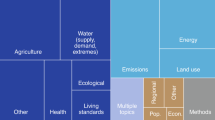Abstract
Large-scale environmental research efforts are conducted under frameworks that provide a common basis for evaluating research in many diverse fields. Such frameworks should be subjected to critical review to determine if they meet crucial expectations. In the case of the US Global Change Research Program, we perceive that most research follows a framework that we define as the predictive model framework. We believe this framework is insufficient for resolving the unprecedented predicaments posed by global change. We recommend a complementary framework, the system response framework, which directs research toward useful indicators of change rather than precise predictions. We further argue that, even if research is complementary and effective under the two frameworks, conclusive results prior to decisions should not be expected. The burden of proof must itself be a continuing topic of open discourse and inquiry.
Similar content being viewed by others
Literature Cited
Ausubel, J. H. 1991. A second look at the impacts of climate change.American Scientist 79:210–221.
Bella, D. 1992. Research and the future of the technosphere. Paper presented at Sigma Xi Lecture, 19 May 1992, Oregon State University, Corvallis, Oregon, 28 pp.
Bella, D. A., and W. S. Overton. 1972. Environmental planning and ecological possibilities.Journal of Sanitary Engineering Division, American Society of Civil Engineering SA3:579–592.
Bella, D., H. Li, and R. Jacobs. 1992. Ecological indicators of global climate change: Proceedings of a US Fish and Wildlife Service Workshop, 13–15 November 1990, Oregon State University, Corvallis. US Fish and Wildlife Service, Cooperative Research Units Center, Washington, DC, 50 pp.
Bohr, N. 1934. Atomic theory and the description of nature. Cambridge University Press, Cambridge, 119 pp.
Bohr, N. 1950. On the notions of causality and complementarity.Science 3:51–54.
Broecker, W. A., D. M. Peteet, and D. Rind. 1985. Does the ocean-atmosphere system have more than one stable mode of operation?Nature 315:21–26.
Campbell, J. 1982. Grammatical man. Simon and Schuster, New York, 102 pp.
Colglazier, E. W. 1991. Scientific uncertainties, public policy, and global warming: How sure is sure enough?Policy Studies Journal 19(2):61–72.
Committee on Earth and Environmental Sciences. 1992. Our changing planet: The FY 1992 US Global Change Research Program. Committee on Earth and Environmental Sciences, c/o U.S. Geological Survey, Reston, Virginia, 90 pp. + appendixes.
Dawson, W. R., J. D. Ligon, J. R. Murphy, J. P. Myers, D. S. Simberloff, and J. Verner. 1987. Report of the scientific advisory panel on the spotted owl.Condor 89:205–229.
Diamond, J. M. 1989. Species border and metabolism.Nature 337:692–693.
Doak, D. 1989. Spotted owls and old growth logging in the Pacific Northwest.Conservation Biology 3:389–396.
Houghton, J. T., G. J. Jenkins, and J. J. Ephraums (eds.). 1990. Climate change, the IPCC scientific assessment. Cambridge University Press, Cambridge, 365 pp.
Hunsaker, C. T., and D. E. Carpenter. 1990. Environmental monitoring and assessment program: Ecological indicators. US Environmental Protection Agency, Office of Research and Development, Research Triangle Park, North Carolina, 443 pp.
Kerr, R. A. 1992. When climate twitches, evolution takes great leaps.Science 257:1622–1624.
Matthews, W. J., and E. G. Zimmerman. 1990. Potential effects of global warming on native fishes of the southern Great Plains and the Southwest.Fisheries 16(6):26–32.
Mearns, L. E., P. H. Gleick, and S. H. Schneider. 1990. Climate forecasting. Pages 87–137in P. E. Waggoner (ed.), Climate change and US water resources. John Wiley & Sons, New York.
Newsweek. 1989. Is it all just hot air. November 1989:64–66.
Overton, W. S., and L. M. Hunt. 1974. A view of current forest policy, with questions regarding the future state of forests and criteria of management.Transactions, North America Wildlife and Natural Resources Conference 39:334–353.
Panel on Policy Implications of Greenhouse Warming (of the Committee on Science, Engineering, and Public Policy of the National Academy of Sciences, National Academy of Engineering, and Institute of Medicine). 1992. Policy implications of greenhouse warming: Mitigation, adaptation, and the science base. National Academy Press, Washington, DC.
Roberts, L. 1991. Learning from an acid rain program.Science 251:1302–1305.
Root, T. 1988a. Environmental factors associated with the avian distributional boundaries.Journal of Biogeography 15:489–505.
Root, T. 1988b. Energy constraints on avian distributions and abundances.Ecology 69:330–339.
Running, S. W., and R. R. Nemani. 1991. Regional hydrologic and carbon balance responses of forests resulting from potential climate change.Climatic Change 19:349–368.
Schneider, S. H. 1989. Global warming. Vintage Books, New York, 343 pp.
Zachos, J. C., J. R. Breza, and S. W. Wise. 1992. Early Oligocene ice-sheet expansion on Antarctica.Geology 20:569.
Author information
Authors and Affiliations
Rights and permissions
About this article
Cite this article
Bella, D.A., Jacobs, R. & Li, H. Ecological indicators of global climate change: A research framework. Environmental Management 18, 489–500 (1994). https://doi.org/10.1007/BF02400854
Issue Date:
DOI: https://doi.org/10.1007/BF02400854




